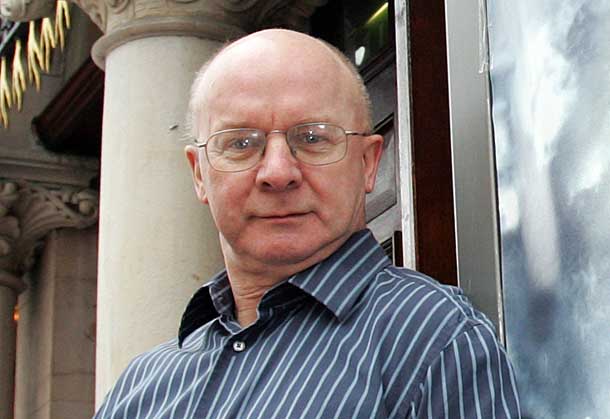30 April 2012 Edition
Dramatic ideas
Writer/director Peter Sheridan writes for An Phoblacht

Peter Sheridan is a writer/director. He’s currently touring a show based on his memoir, 47 Roses. A new book, Break A Leg, is due out in the autumn.
Jim and I were at UCD when internment and Bloody Sunday happened. We hijacked the college drama society to put on a play about these events, based on Sophocles’ drama, Oedipus Rex. We used music by Jim Morrison and The Doors
THE QUESTION I’m most frequently asked is: ‘Where do your ideas come from?’ I have no hesitation in saying that I find my own experience, my own journey, infinitely more interesting than anyone else’s. It took me years, though, to trust in my own background, to believe that the events that had shaped me were important and worth sharing with the world.
I was 45 years old when I sat down to write my first book, 44, based on my growing up in Dublin’s North Wall area. I always knew when I came to write my childhood story that I would have to deal with the death of my young brother, Frankie, who passed away as a result of a brain tumour in 1967. It had a devastating effect on our family at the time and, once I started to write the account of it, the pain and hurt resurfaced and almost overwhelmed me. I cried with every line I wrote of that chapter.
My father took to the bed after Frankie’s death, suffering from persistent migraine. At one stage we thought it was a tumour that would kill him too. However, he survived and when the crisis passed he told us all that he was going to start a drama group because he’d always wanted to try his hand at ‘the acting thing’. (My Ma went along with it even though she thought he was losing the plot!) In 1968, Da founded the St Laurence O’Toole’s Musical & Dramatic Society and fulfilled his dream of going on the stage.
I had grown up with an idea of the theatre as an escape, an opinion formed from my experience of seeing Jimmy O’Dea, Maureen Potter and Jack Cruise in the annual Christmas Panto at the Gaiety and Olympia theatres. However, in the narrative of my family, the theatre had entered our lives and saved us. It was our salvation. My father gave me the gift of the theatre when I was 16 years old. We performed the plays of Seán O’Casey and I loved it from the get-go. I’d been in a garage band at that point with my brother, Jim (he played bass and I played lead guitar), but once we discovered the power of the drama it became our abiding obsession.
In the space of three years we were writing and producing our own material. We got involved in the Project Arts Centre which was then housed in the basement of the Metropolitan Hall, across the road from the Abbey Theatre. Our most infamous show was Journal of a Hole, which told the story of a young Dublin boy’s journey through an industrial school in Letterfrack. It pulled no punches in its depiction of the physical abuse meted out by the Christian Brothers (in one scene a boy who wet the bed was made stand in his dormitory all night wearing a nappy) and we even stage-managed an interruption from the audience claiming that the content of the play was fictitious and a slight on the men of the collar.
It always felt to me, from our beginnings with my father, that the theatre, far from being an escape from reality, was a powerful tool in confronting what was going on in the world. By 1972, Jim and I were both students in University College Dublin. Like many of our contemporaries, we were more concerned with what was happening in the North of Ireland than we were with our studies. Internment without trial had been introduced in August 1971. That was followed by mass protests, culminating in Bloody Sunday in Derry, January 1972.
We hijacked the college drama society and decided to put on a play about these events. We chose Sophocles’ drama, Oedipus Rex, and relocated it to Belfast and Derry. In the original play, the city of Thebes is under threat because the crops won’t grow; in our version, the society is doomed because of martial law. For Oedipus, read Brian Faulkner, the then Prime Minister of the unionist regime at Stormont. I got the role because, like Faulkner, I was small. I also sported blond hair in those days (long since departed). We used music by Jim Morrison and The Doors, notably the apocalyptic The End, itself a version of the Oedipus legend. We put the audience on tiered scaffolding and had ushers armed with guns show them to their seats. All of our decisions were geared towards making the audience feel they were in a space dominated by the threat of violence.
I’ve always felt that the theatre needs to address the big issues of the day. Just as my own work cannot avoid the family, neither can the stage be deaf to what’s happening outside its door. It needs to be much more than mere entertainment if it is to touch people’s lives in any meaningful way.
Peter Sheridan is a writer/director. He’s currently touring a show based on his memoir, 47 Roses. A new book, Break A Leg, is due out in the autumn.



